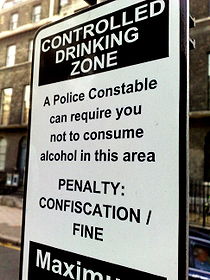
Designated Public Places Order
Encyclopedia

Police
The police is a personification of the state designated to put in practice the enforced law, protect property and reduce civil disorder in civilian matters. Their powers include the legitimized use of force...
officers discretionary powers to require a person to stop drinking and confiscate alcohol
Alcohol
In chemistry, an alcohol is an organic compound in which the hydroxy functional group is bound to a carbon atom. In particular, this carbon center should be saturated, having single bonds to three other atoms....
or containers of alcohol in public places. In the London Borough of Southwark
London Borough of Southwark
The London Borough of Southwark is a London borough in south east London, England. It is directly south of the River Thames and the City of London, and forms part of Inner London.-History:...
, DPPOs are also called Alcohol Control Areas (ACAs), while in the London borough of Hammersmith and Fulham
London Borough of Hammersmith and Fulham
The London Borough of Hammersmith and Fulham is a London borough in West London, and forms part of Inner London. Traversed by the east-west main roads of the A4 Great West Road and the A40 Westway, many international corporations have offices in the borough....
, they are called Controlled Drinking Areas (CDAs) or Controlled Drinking Zones (CDZs). Failure to comply with alcohol restrictions in DPPOs can result in arrest and/or a fine of up to £500. DPPOs are implemented by local councils
Local government in the United Kingdom
The pattern of local government in England is complex, with the distribution of functions varying according to the local arrangements. Legislation concerning local government in England is decided by the Parliament and Government of the United Kingdom, because England does not have a devolved...
in order to address alcohol-related crime and disorder in public places. 712 DPPOs have implemented by local authorities since Section 13 of the Police and Criminal Justice Act 2001 gave councils the power to do so where they were satisfied that areas were suffering from alcohol-related crime and disorder. A common impact of enforcement of DPPO powers is displacement of street drinking to nearby areas.
A number of local authorities have used DPPOs to successfully reduce alcohol related ASB, but have stressed that DPPOs are not the solution to these problems but a useful tool to help address them. Some criticism has been levelled at the discriminatory element of the legislation (for instance should picnic
Picnic
In contemporary usage, a picnic can be defined simply as a pleasure excursion at which a meal is eaten outdoors , ideally taking place in a beautiful landscape such as a park, beside a lake or with an interesting view and possibly at a public event such as before an open air theatre performance,...
kers be allowed to drink openly in a park where street drinkers are?) but generally an officers' discretion is considered sufficient to take appropriate action or not. Some reports from police have also indicated the powers can be useful for addressing ASB related to the Night Time Economy and problems from licenced premises.
Section 26 of the Violent Crime Reduction Act 2006
Violent Crime Reduction Act 2006
The Violent Crime Reduction Act 2006 is an Act of the Parliament of the United Kingdom.-Origin:The United Kingdom Government published a paper "Drinking Responsibly - The Government's Proposals" in 2005 setting out their proposals for introducing Drinking Banning Orders...
makes some amendments to the law surrounding the designation of public places during public events.

